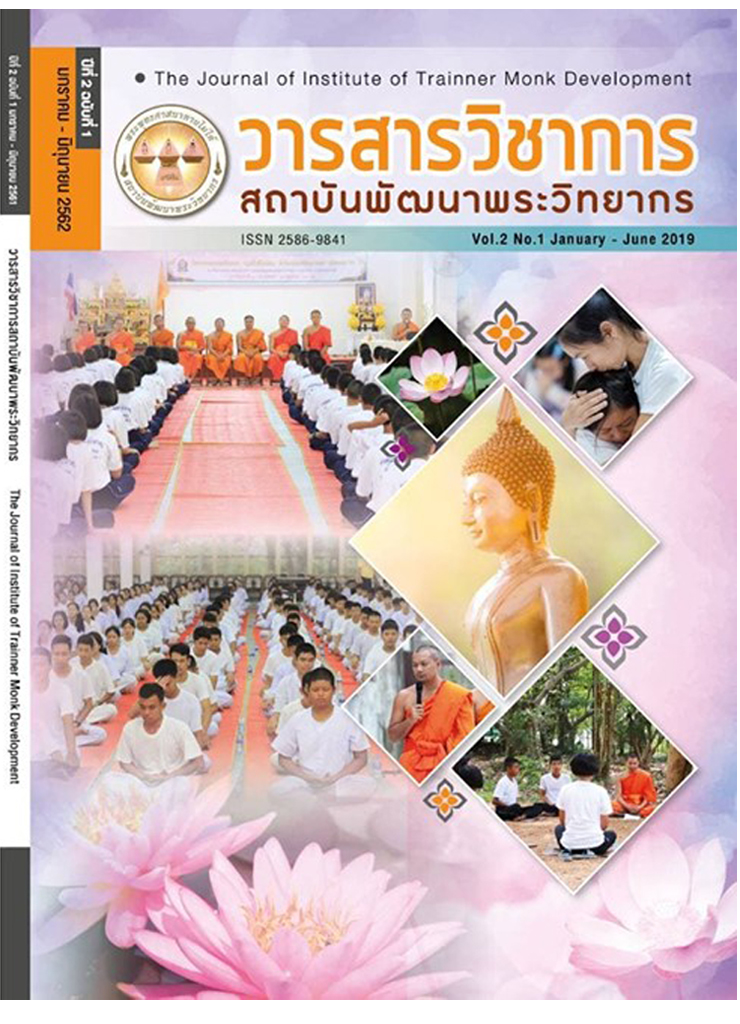Integration of Humanistic Psychology and Threefold for Self-Development
Main Article Content
Abstract
The purpose of this article is to propose that Self-development is important in all departments, organizations and nation because people are the most important resource which is considered the heart of the administration. If a person with good performance goes to work at any agency, that agency will have progress. On the other hand, if any agency gets inefficient people to work with, that agency will only have backwardness and unable to compete with agencies that have
efficient employees. Self-development is therefore a mechanism to drive the organization to progress. Both developers and organizations that they belong to self-development can occur which requires the concept of the theory of the
West such as Maslow’s theory and Buddhism principles to be integrated together until being clear in the direction of development which is the knowledge of
human development.
Article Details
บทความที่ได้รับการตีพิมพ์เป็นลิขสิทธิ์ของวารสารวิชาการสถาบันพัฒนาพระวิทยากร
ข้อความที่ปรากฎอยู่ในบทความที่ได้รับการตีพิมพ์ในวารสาร ถือเป็นความรับผิดชอบของผู้เขียนบทความ และข้อคิดเห็นนั้นไม่ถือว่าเป็นทัศนะและความรับผิดชอบของกองบรรณาธิการวารสารวิชาการสถาบันพัฒนาพระวิทยากร
References
นฤมล มารคแมน. (2553). หลักพุทธจิตวิทยาเบื้องต้น. กรุงเทพมหานคร: สำนักพิมพ์มหาวิทยาลัยรามคำแหง.
พระพรหมคุณาภรณ์ (ป.อ. ปยุตฺโต). (2558). หลักแม่บทของการพัฒนาตน. พิมพ์ครั้งที่ 26. กรุงเทพมหานคร: ผลิธัมม์.
พระพรหมคุณาภรณ์ (ป.อ. ปยุตฺโต). (2559). พจนานุกรมพุทธศาสตร์ ฉบับประมวลธรรม. พิมพ์ครั้งที่ 36 กรุงเทพมหานคร: ผลิธัมม์.
พระอุปติสสเถระ. (2560). คัมภีร์วิมุตติมรรค. แปลโดย พระพรหมบัณฑิต (ประยูร ธมฺมจิตฺโต)และคณะ. พิมพ์ครั้งที่ 2. กรุงเทพมหานคร: โรงพิมพ์มหาวิทยาลัยมหาจุฬาลงกรณราชวิทยาลัย.
พุทธทาสภิกขุ. (2553). ธรรมคือสิ่งพัฒนาชีวิต. สุราษฎร์ธานี: ธรรมทานมูลนิธิ ไชยา.
พุทธทาสภิกขุ. (2556). สัมมาทิฏฐิ. นนทบุรี: ห้างหุ้นส่วนจำกัด เชน ปริ้นติ้ง.
มหาจุฬาลงกรณราชวิทยาลัย. (2500). พระไตรปิฎกภาษาบาลี ฉบับมหาจุฬาลงกรณราชวิทยาลัย. กรุงเทพมหานคร: โรงพิมพ์มหาจุฬาลงกรณราชวิทยาลัย.
มหาวิทยาลัยมหาจุฬาลงกรณราชวิทยาลัย. (2557). วารสารบัณฑิตศึกษาปริทรรศน์. กรุงเทพฯ: โรงพิมพ์มหาวิทยาลัยมหาจุฬาลงกรณราชวิทยาลัย.
เมธาวี อุดมธรรมานุภาพ. (2556). จิตวิทยาเพื่อการพัฒนาตน. กรุงเทพมหานคร: ห้างหุ้นส่วนจำกัด เจ.เอส.พริ้นท์ติ้ง.
ราชบัณฑิตยสถาน. (2556). พจนานุกรมศัพท์จิตวิทยา. กรุงเทพมหานคร: ธนาเพรส.
สมเด็จพระพุทธโฆษาจารย์ (ป.อ. ปยุตฺโต). (2558). บทนำสู่พุทธธรรม. พิมพ์ครั้งที่ 4. กรุงเทพ-มหานคร: ส.ไพบูลย์การพิมพ์.
สมเด็จพระพุทธโฆษาจารย์ (ป.อ. ปยุตฺโต).(2561). “ธรรมกาย” แท้ของพระพุทธเจ้า เข้าใจ “อนัตตา” ให้ตรงตามความเป็นจริง.พิมพ์ครั้ง 2. กรุงเทพมหานคร: ผลิธัมม์.
Bourne . Ekstrand. (1985). Psychology its Principles and Meanings. 5th Edition. New York: CBS College Publishing.
Dennis Coon and John O. Mitterer. (2012). Introduction to Psychology. China: WADSWORTH.
James Geiwitz. (1980). Psychology Looking at Ourselves. 2nd Edition. New York: CAT.
Kazdin Alan E . (1980). Behavior Modification in Applied Settings. Revised Edition. Illinois: The Dorsey Press.
McLeod, S. A. (2007). Maslow’s Hierarchy of Needs. Retrieved on 20th January 2019, from http://www.simplypsychology.org/maslow.html.
Richard W. Robins and Kari H. Trzesniewski. (2019). Self-Development A cross the Life span. Retrieved on 20th January 2019, from https;//scholarship.org2 uc2item29bc5r8nd.


